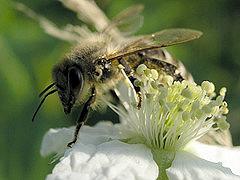 德國「反拜耳危害聯盟」(Coalition against Bayer Danger)25日採取法律行動,針對拜耳管理委員會主席溫寧(Werner Wenning),向弗來堡檢察官提出指控。聯盟控訴拜耳作物科學公司(Bayer CropScience)「行銷危險的殺蟲劑,導致全球蜜蜂大量死亡」。
德國「反拜耳危害聯盟」(Coalition against Bayer Danger)25日採取法律行動,針對拜耳管理委員會主席溫寧(Werner Wenning),向弗來堡檢察官提出指控。聯盟控訴拜耳作物科學公司(Bayer CropScience)「行銷危險的殺蟲劑,導致全球蜜蜂大量死亡」。
聯盟與德國的蜂農一起提出指控,他們認為2008年5月所損失的數千蜂巢,是受到拜耳「可尼丁」(clothianidin)殺蟲劑的毒害。
拜耳從1991年開始生產「益達胺」(imidacloprid)殺蟲劑,這是全世界銷售最佳的農藥之一,通常在播種前施用在玉米、向日葵和油菜的種籽上。拜耳出口益達胺到120個以上的國家,是拜耳最暢銷的殺蟲劑。
聯盟指出,當益達胺在大多數國家的專利權到期之後,拜耳推出了類似的接替產品「可尼丁」n)進入市面。這兩種化學物質的作用範圍包含了種籽到植株的整個系統,因此會進入花粉與花蜜中,對蜜蜂等益蟲造成危害。
聯盟也指出,益達胺與可尼丁問世的時間,與歐美許多國家發生蜂群大規模死亡的時間吻合,受到影響的蜂巢將近七成。過去10年來,法國有約900億隻蜜蜂死亡,蜂蜜產量僅剩四成。
代表反拜耳危害聯盟的律師舒澤(Harro Schultze)表示,「在法國禁售益達胺與可尼丁之後,拜耳究竟用了哪些方法才讓這兩種農藥沒有在德國被禁止,檢察官應該加以查明。我們懷疑拜耳提供了有瑕疵的研究結果,把植物殘留殺蟲劑的風險加以淡化。」
法國從1999年開始禁止對向日葵種籽施用益達胺,2003年後也禁用在甜玉米上。法國政府在2003年召開「科技委員會」(Comité Scientifique et Technique),公佈在種籽施用益達胺對蜜蜂有嚴重危害。拜耳的可尼丁許可申請也遭到法國主管單位駁回。
可尼丁與益達胺同屬於新型的「新菸鹼類」(neonicotinoids)殺蟲劑,會影響昆蟲的中央神經系統。聯盟要求拜耳在全球停止販售所有的新菸鹼類農藥。
聯盟發言人敏克斯(Philipp Mimkes)表示,「新菸鹼類殺蟲劑每年帶來近8億歐元的營收,是拜耳最重要的產品之一,所以拜耳才會無視於對環境的嚴重破壞,拚命挑戰所有的禁令限制。」
因為新菸鹼類農藥對蜂群造成的負面影響,德國從5月開始禁止在種籽上使用。德國西南部巴登符騰堡邦(Baden-Württemberg)的蜂農損失了大量的蜂群,與可尼丁有關。
拜耳公司表示,因為農民將農藥塗抹在種籽表面的時候,沒有正確使用黏著劑,農藥才會滲入環境中。缺少黏著劑,農藥就會從播下的油菜或玉米種籽上飄散,才影響了蜜蜂。
拜耳作物科學公司的生態學家舒馬克博士(Richard Schmuck)在6月指出,「我們所知的研究都證實,若遵照建議的塗抹標準,我們的產品對蜜蜂是安全的。這一點在向主管產品登錄的機關,提交產品安全評估時也有提到。」
他表示,「正確使用之下,這項作物保護產品對於施用者、消費者和環境都是安全的,也符合國際對生態系統的安全標準。」
在美國,為了要求聯邦政府公佈可尼丁對蜜蜂影響的研究結果,非營利組織自然資源保護委員會(NRDC)也在8月15日向華盛頓聯邦法庭提告。美國從2006年開始發生蜂群衰竭失調現象(CCD),迄今已損失超過1/3的蜜蜂。
The German organization Coalition against Bayer Dangers today brought legal action against Werner Wenning, chairman of the Bayer AG Board of Management, by filing a charge against him with the public prosecutor in Freiburg. The group accuses Bayer CropScience of "marketing dangerous pesticides and thereby accepting the mass death of bees all over the world."
The coalition filed the charge in cooperation with German beekeepers who claim they lost thousands of hives after poisoning by the Bayer pesticide clothianidin in May.
Since 1991, Bayer has been producing the insecticide imidacloprid, which is one of the best selling insecticides in the world, often used as seed-dressing for maize, sunflower, and rape. Bayer exports imidacloprid to more than 120 countries and the substance is Bayer's best-selling pesticide.
Since patent protection for imidacloprid has expired in most countries, Bayer in 2003 brought a similarly functioning successor product, clothianidin, onto the market, the coalition alleges. Both substances are systemic chemicals that work their way from the seed through the plant. The substances get into the pollen and the nectar and can damage beneficial insects such as bees.
The coalition alleges that the start of sales of imidacloprid and clothianidin coincided with the occurrence of large-scale bee deaths in many European and American countries. Up to 70 percent of all hives have been affected. In France, approximately 90 billion bees died over the past 10 years, reducing honey production by up to 60 percent.
Attorney Harro Schultze, who represents the Coalition against Bayer Dangers said, "The public prosecutor needs to clarify which efforts Bayer undertook to prevent a ban of imidacloprid and clothianidin after sales of both substances were stopped in France. We're suspecting that Bayer submitted flawed studies to play down the risks of pesticide residues in treated plants."
In France, imidacloprid has been banned as a seed dressing for sunflowers since 1999 and in 2003 was also banned as a sweet corn treatment. Convened by the French government, in 2003 the Comité Scientifique et Technique declared that the treatment of seeds with imidacloprid leads to significant risks for bees. Bayer's application for approval of clothianidin was also rejected by French authorities.
Clothianidin and imidacloprid are two of a relatively new class of insecticides known as neonicotinoids that impact the central nervous system of insects. The coalition is demanding that Bayer withdraw all neonicotinoids from the market worldwide.
"With an annual turnover of nearly 800 million euro, neonicotinoids are among Bayer's most important products," said Philipp Mimkes, spokesman for the Coalition Against Bayer-Dangers. "This is the reason why Bayer, despite serious environmental damage, is fighting against any application prohibitions."
Germany banned neonicotinoids for seed treatment in May 2008, due to negative affects on bee colonies. Beekeepers in the Baden-Württemberg region suffered a severe decline linked to the use of clothianidin.
Bayer says the pesticide entered the environment because farmers failed to apply an adhesive agent that affixes the compound to the seed coats. Without the fixative agent, Bayer says, the compound drifted into the environment from sown rapeseed and sweet corn and then affected the honeybees.
Dr. Richard Schmuck, an ecologist at Bayer CropScience, said in June, "All studies available to us confirm that our product is safe to bees if the recommended dressing quality is maintained. This is also shown by the product safety assessments which we have submitted to the registration authorities."
"When used correctly," he said, "this crop protection product is safe for operators, consumers and the environment and fulfills the international criteria with regard to ecological systems."
In the United States, the nonprofit Natural Resources Defense Council filed a lawsuit August 15 in federal court in Washington, DC to force the federal government to disclose studies it ordered on the effect of clothianidin on honey bees. Colony collapse disorder has claimed more than one-third of honey bees in the United States since it was first identified in 2006.




